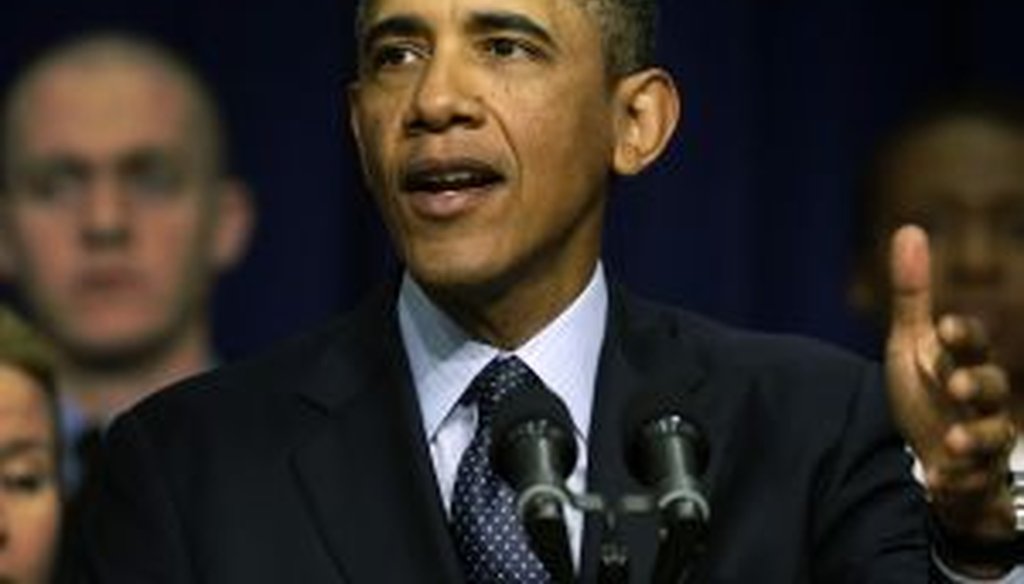Get PolitiFact in your inbox.

President Obama has argued for a mix of spending cuts and tax increases in place of the sequester.
It’s Washington’s latest case of economic hostage-taking: If Congress and President Barack Obama don’t reach a deal by March 1, the federal budget gets whacked!
Voters have heard these fiscal threats before. This time, the cuts are part of existing law. Inaction means nearly across-the-board spending cuts, with half the cuts taken from the defense and the military.
Here’s PolitiFact's guide to that funny word, sequestration.
Whose fault is the sequester?
Both the White House and Congress, Democrats and Republicans, signed off on the agreement leading to the sequester.
Here’s the background: In the summer of 2011, Obama and Congress were in a high-stakes stand-off over the debt limit. House Republicans insisted on spending cuts before increasing the debt limit. This was a notable change from the past, when members of Congress from both parties would pass debt ceiling increases with relatively little fuss.
Obama and Speaker of the House John Boehner tried unsuccessfully to reach a "grand bargain" to put the federal budget on more stable footing. When that failed, they arrived at the much less ambitious Budget Control Act of 2011.
That law included about $1.2 trillion in future budget cuts, but it also directed Congress to find another $1.2 trillion via a bipartisan "supercommittee." As further incentive, the law had a threat: If a supercommittee couldn’t agree on a package, or if Congress voted down the supercomittee proposal, a sequester would automatically go into effect, putting in place nearly across-the-board budget cuts, with half coming from defense.
Both Obama and Boehner supported the plan and urged Congress to pass it, which it did, with bipartisan majorities. The supercommittee deadlocked, though, so it never proposed new cuts. Hence the sequester.
Whose idea was it?
It was Obama’s idea, but Republicans agreed to it and provided key support.
The most detailed account on this point is in The Price of Politics, a book by Washington Post journalist Bob Woodward about the 2011 debt ceiling standoff. His reporting shows the White House developed the idea and presented it to Democratic leadership on July 28 and to Boehner’s team on July 30.
Both sides saw it as a way to force further negotiations later, according to Woodward. The Obama team thought there was "no chance" Republicans would allow defense cuts to happen, while Boehner said Democrats would cave to save domestic programs. Woodward quotes Boehner predicting the sequester "is never going to happen."
Republicans have repeatedly said the sequester was Obama’s idea, but they supported it early on and provided the votes needed to put it into law.
Who wants it to happen?
The prevailing -- stated -- opinion in both parties is "Sequestration: bad."
"Part of the whole reason (lawmakers) thought that the sequester would work was it was so stupid and awful," said Steve Ellis, vice president of Taxpayers for Common Sense.
What we’re witnessing now is a game of brinksmanship: Obama has proposed a plan to avert the cuts that combines closing tax loopholes with cutting federal spending; Republicans have offered their version with only spending cuts.
"They are putting forward proposals … that they know the other side is going to reject," Ellis said. "It’s like they’re holding out for total victory."
That’s the the outward account, anyway. Norman Ornstein, a scholar at the conservative American Enterprise Institute, says there’s a second, behind-the-scenes storyline:
"A sizable number of members of Congress want a sequester; the overwhelming majority of them are House Republicans who believe that this is the best way to get a down payment on spending cuts, and don't believe (or care) that national security might be at risk. They also are convinced that these cuts won't affect any real services, in part because they really believe that most government is wrongheaded, irrelevant or just waste and fraud. ...," Ornstein said. "Very few Democrats want a sequester; a few think it will backfire on Republicans, and so are secretly happy. But most would much prefer a deal to avoid it."
It’s the blunt, indiscriminate nature of sequestration that policymakers dislike. But at least among Republicans, there’s a strong appetite for belt-tightening.
"This year’s cuts are less than 1 percent of the $8.7 trillion in new debt that will be racked up over the next decade," said Alison Fraser, with the conservative Heritage Foundation. "So absolutely, sequester level cuts are necessary."
What if it does happen?
"Across-the-board cuts" in "discretionary domestic spending" sounds pretty nebulous. But think about these federal programs and agencies: the Centers for Disease Control and Prevention, border security, airport security, Head Start, special education, FEMA’s disaster relief budget and NASA. Now think about them (plus many others) having billions less to perform their functions, and the picture becomes a little clearer.
Sharon Parrott, a vice president at the left-leaning Center on Budget and Policy Priorities, said the cuts will remind the public of "some of the really basic things that government does." One example: meat inspectors, who are likely to be subjected to furloughs.
Most people don’t think about their role as they stroll through the grocery aisles, she said. "We just buy the meat and don’t worry about it."
But she emphasized that some people could feel the impacts directly. Head Start, which awards grants to states for school readiness, as well as a fund that provides child care subsidies for low-income working parents, would see cuts. Health programs that provide immunizations and cancer screenings to needy families are also vulnerable.
Keep in mind, though, that many government services were exempted from the sequester. Tax returns will still go out. Seniors won’t lose their Medicare benefits. Veterans benefits and military pay won’t be affected.
To Fraser, that’s another example of Obama and Democrats "kicking the can down the road."
"This is inexcusable: Entitlements must be reined in since they are the major cause of future deficits," she said.
But for Americans worried about a cataclysm next Friday, "it’s not going to be hellfire and brimstone," Ellis said.
Our Sources
See individual fact-checks for complete sources.




















































